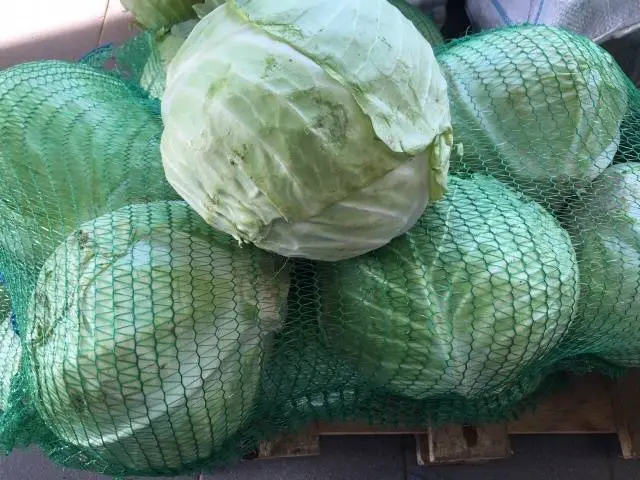Contents
White cabbage is considered a versatile vegetable. It can be used in any form. The main thing is to choose the right variety. Unfortunately, today it is not so easy to do this, since breeders expand their range every year. In order not to be mistaken, you need to know the characteristics of the selected variety, taste and culinary possibilities. Tobia F1 cabbage is one of the varieties that are popular with gardeners and housewives for their unique properties.
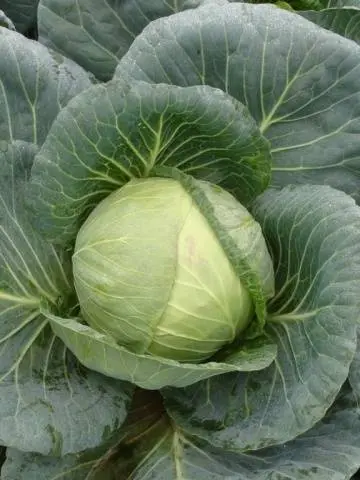
Description
The Tobia hybrid was created by Dutch breeders. Since 2005, cabbage has been in the State Register of the Federation. The variety is recommended for cultivation in the private sector and on a large industrial scale in many regions of our country.
Hybrid Tobia refers to early ripening varieties. Cabbage reaches technical maturity in 90 days from the moment of germination. The outer stalk is small, the plant does not rise high above the ground. Therefore, cabbage receives accelerated nutrition, useful substances work to form a head.
The upper and outer leaves are dark green, with a waxy coating, they are distinguished by density and small pimple. There are barely noticeable waves along the edge. During maturation, the leaves curl so tightly into forks that gaps are practically not visible on the cut. The middle of the head is white or slightly yellowish.
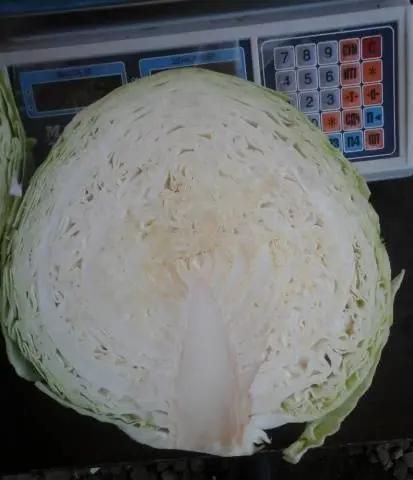
The mass of Tobia cabbage, according to the description of the variety and reviews of gardeners, is about 5 kg. Subject to agricultural technology, you can get forks weighing up to 7 kg. Heads of cabbage are round-dense. The lower leaves are close to the ground. The veins are light green, well visible on the sheets, but not too hard.
Characterization
The description of cabbage does not always give a complete picture of the variety. To decide on cultivation, you need to get acquainted with the characteristic features, advantages and disadvantages.
Advantages
- Tobia cabbage is juicy, without bitterness, slightly sweet. The leaves are thin, without coarse veins.
- Even overripe heads of cabbage do not crack.
- The variety is high-yielding, up to 20 kg are harvested from a square meter, subject to agricultural technology. If we consider the yield on an industrial scale, then up to 100 tons are harvested from one hectare.
- Excellent transportability.
- The white-headed vegetable is intended for cultivation in an open ground.
- The hybrid of universal purpose is widely used in cooking. Pickled and sauerkraut are especially tasty.
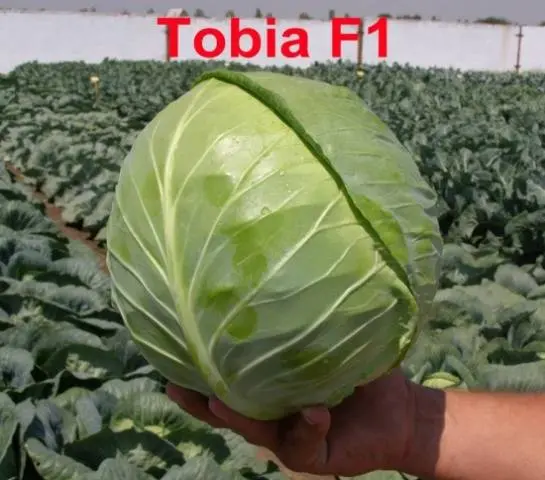
Cons
Gardeners do not note any special shortcomings in the Tobia F1 variety, although they are:
- short shelf life fresh – no more than three months;
- the proximity of the leaves to the soil and abundant watering lead to decay.
Since the variety has a minimum number of negative sides, Tobia cabbage takes its well-deserved place in the beds of s.
Growing seedlings
Judging by the description and characteristics, Tobia cabbage is an early ripe white vegetable. When planting seedlings at different times, you can get heads of cabbage, from June to autumn. The hybrid is grown mainly through seedlings.
Sowing is done from the first days of April. By the time of planting in the ground, the seedlings have time to grow.
soil
Strong and healthy Tobia hybrid cabbage grows if agrotechnical standards are applied. You need to start with the preparation of the land. Cabbage of this variety is a lover of loose fertile soil. You can use store-bought compounds, but most gardeners prepare the soil themselves. In addition to sod land, compost, peat, and humus are added. At seedling level, fresh manure is not added.
For growing, use boxes with a depth of at least 6 cm, containers, cassettes or nurseries on the street. The soil can be prepared in different ways:
- warm up in the oven;
- spill pink boiling water (dissolve potassium permanganate).
seed
According to the reviews of gardeners who have been dealing with Tobia cabbage for more than one year, the germination of store seeds is almost one hundred percent. Stages of preparation:
- Selection. Choose large specimens, feeble and dubious grains are discarded.
- hardening. The cabbage seeds are transferred to gauze and dipped in hot water (no more than 50 degrees) for a third of an hour. Then cool in cold water.
- Etching. For 10-15 minutes, the seeds in a gauze bag are immersed in a pink solution of potassium permanganate to prevent the black leg. After that, rinse with clean water.
- Stratification. Cabbage seeds in gauze are placed in the refrigerator on a shelf for vegetables. A day later, white strings of roots hatch.
Seeds are ready, you can start growing seedlings.
Sowing
You can sow seeds in a common hotbed for subsequent picking or in separate cassettes or cups, peat tablets.
Growing seedlings of Tobia cabbage without diving is a convenient way, because when transplanted to a permanent place, the plants are not injured, they take root quickly. The only drawback is to increase the amount of seed, since you have to sow 2-3 seeds in each cassette. Then leave the strongest seedling.
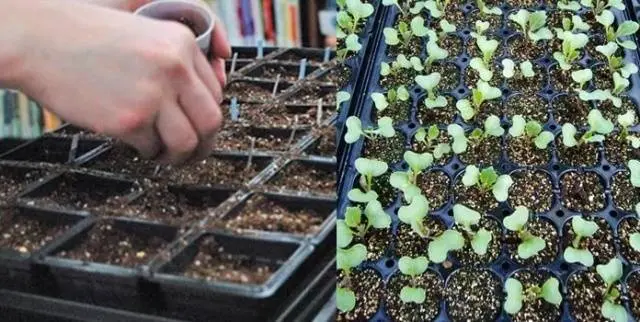
When sowing in a common nursery, the seeds are buried by 1 cm with a step in the groove of at least 3 cm. Then they are covered with glass or film to create a greenhouse effect. Cabbage seeds sprout faster if the containers are kept at a temperature of 20 to 22 degrees. After the first shoots, it must be reduced to 8-10 so that the plants do not stretch.
Tobia cabbage seedlings develop best at a temperature of 14 to 18 degrees and high humidity. If the seeds have sprouted densely, then the seedlings must be dived for successful development.
The first feeding of seedlings of the Tobia hybrid is carried out when the first leaf appears, then every week until planting in a permanent place.
In order for the seedlings to take root well, it is adapted to new conditions. For 10 days, seedlings of the variety are hardened, opening access to fresh air and direct sunlight.
Cultivation and care
Landing
Hybrid Tobia at the age of 30-40 days is planted in a permanent place. At this time, the seedlings have 5-6 true leaves and a strong stocky stem.
When growing cabbage of any variety, it is necessary to choose the appropriate soil. Best of all, the Tobia variety is obtained on a loamy substrate. But on acidic soils, a white vegetable does not grow well, and the risk of keel disease increases. If you are not sure about the acidity of the soil, then when making humus, compost or phosphorus-potassium fertilizers, you can add dolomite flour, fluff lime or wood ash.
The place for Tobia cabbage should be well lit. A short daylight hours adversely affects the formation of a head of cabbage. It will be loose, like a broom. It is good to plant cabbage after onions, cucumbers, carrots, tomatoes, cereals and legumes. Moreover, the place changes every 4-5 years, otherwise diseases and pests will accumulate in the soil.
Under the Tobia hybrid, holes are made according to the 50×40 scheme, in row spacing up to 60 cm. Since the plants are not sprawling, this density allows not only to get heads of the right size, but also to stretch the ripening time.
Deepen the seedlings to the first true leaf, carefully compressing the soil. Watering should be done carefully so that the plants are not pulled down with water.
How to plant seedlings of cabbage in the ground:
Features of care
As gardeners write in reviews, Tobia cabbage is not too demanding. But at the beginning of growth, it must be treated carefully. First of all, monitor the state of soil moisture. Watering should be frequent, at a time up to two liters of water are poured under each bush. This is necessary for the development of a strong root system.
In the future, as the hybrid grows, the amount of water increases to 5 liters. If it rains, the number of waterings is reduced. The fact is that the lower leaves of the Tobia variety are located close to the ground and their decay may begin. It is desirable to water the grown white cabbage by heads.
Secondly, weeds should not be allowed to grow, they can provoke diseases and pests. They are removed simultaneously with loosening the soil. This procedure is carried out until the cabbage leaves close.
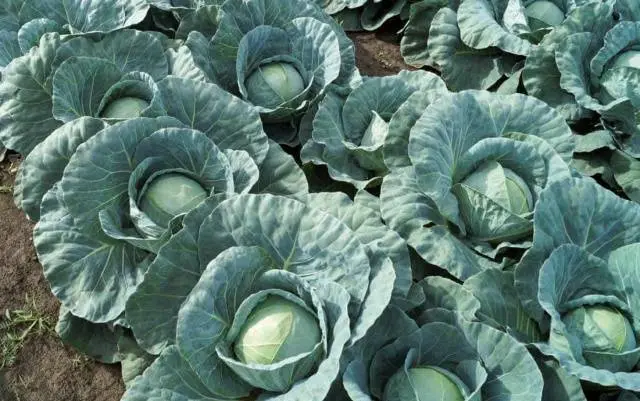
Thirdly, plants need to be fed. Today, gardeners are trying to grow environmentally friendly products, do not use mineral fertilizers. It is good to use an infusion of mullein, chicken manure, wood ash extract or green fertilizer from fermented grass for root dressing of Tobia cabbage. A white vegetable responds well to dusting with dry wood ash.
As for diseases and pests, the Tobia cabbage variety is not very susceptible to them, although preventive measures will not interfere. You can scatter wood ash, tobacco dust, black or red ground pepper under the bushes and on top of the leaves, or plant marigolds, marigolds, dill, parsley or other plants that release ether into the air in the garden.
The only pest that will have to be dealt with manually is cabbage butterfly caterpillars. So far, no drugs have been created that repel insects.
